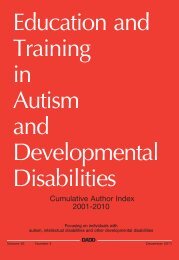Download the Journal (PDF) - Division on Autism and ...
Download the Journal (PDF) - Division on Autism and ...
Download the Journal (PDF) - Division on Autism and ...
You also want an ePaper? Increase the reach of your titles
YUMPU automatically turns print PDFs into web optimized ePapers that Google loves.
Teaching Test-taking Strategies to Improve <str<strong>on</strong>g>the</str<strong>on</strong>g> Academic<br />
Achievement of Students with Mild Mental Disabilities<br />
Allis<strong>on</strong> G. Kretlow, Ya-yu Lo, Richard B. White, <strong>and</strong> LuAnn Jordan<br />
University of North Carolina at Charlotte<br />
Abstract: This study examined <str<strong>on</strong>g>the</str<strong>on</strong>g> effects of teaching a test-taking strategy to 4 fourth- <strong>and</strong> fifth-grade students<br />
with mild mental disabilities <strong>on</strong> reading <strong>and</strong> math achievement. The interventi<strong>on</strong> c<strong>on</strong>sisted of a direct <strong>and</strong><br />
explicit instructi<strong>on</strong>al method using a mnem<strong>on</strong>ic strategy. The participants’ acquisiti<strong>on</strong> <strong>and</strong> applicati<strong>on</strong> of <str<strong>on</strong>g>the</str<strong>on</strong>g><br />
test-taking strategy <strong>on</strong> reading <strong>and</strong> math probes were evaluated using a multiple probe across participants<br />
design. All participants dem<strong>on</strong>strated <str<strong>on</strong>g>the</str<strong>on</strong>g> ability to apply <str<strong>on</strong>g>the</str<strong>on</strong>g> strategy <strong>on</strong> probes during <str<strong>on</strong>g>the</str<strong>on</strong>g> interventi<strong>on</strong>, 2-week<br />
maintenance, <strong>and</strong> generalizati<strong>on</strong> c<strong>on</strong>diti<strong>on</strong>s. Significant gains in achievement were observed for all participants.<br />
Implicati<strong>on</strong>s of teaching test-taking strategies to students with mild to moderate mental disabilities were<br />
discussed.<br />
As achievement accountability measures c<strong>on</strong>tinue<br />
to increase in <str<strong>on</strong>g>the</str<strong>on</strong>g> public educati<strong>on</strong> system,<br />
so do <str<strong>on</strong>g>the</str<strong>on</strong>g> expectati<strong>on</strong>s for students with<br />
disabilities. Current legislati<strong>on</strong> enforces <str<strong>on</strong>g>the</str<strong>on</strong>g><br />
need for students with disabilities to have access<br />
to <str<strong>on</strong>g>the</str<strong>on</strong>g> general educati<strong>on</strong> curriculum, <strong>and</strong><br />
in turn for states to assess those students<br />
through st<strong>and</strong>ardized achievement measures.<br />
The No Child Left Behind Act (NCLB) of<br />
2001 requires that all students in grades three<br />
through eight take state-wide achievement<br />
tests in reading <strong>and</strong> math (Goertz & Duffy,<br />
2003). The NCLB Act in combinati<strong>on</strong> with <str<strong>on</strong>g>the</str<strong>on</strong>g><br />
amendments to <str<strong>on</strong>g>the</str<strong>on</strong>g> Individuals with Disabilities<br />
Educati<strong>on</strong> Improvement Act (IDEIA,<br />
2004), which states that all students must be<br />
included in state <strong>and</strong> district assessments,<br />
present challenges of test-taking to students<br />
with disabilities (Washburn-Moses, 2003).<br />
The performance of students with disabilities<br />
<strong>on</strong> st<strong>and</strong>ardized achievement tests is at<br />
least, in part, resp<strong>on</strong>sible for states attaining<br />
what <str<strong>on</strong>g>the</str<strong>on</strong>g> federal government outlined in <str<strong>on</strong>g>the</str<strong>on</strong>g><br />
NCLB Act as Adequately Yearly Progress<br />
(AYP). To meet AYP, schools must attain goals<br />
related to achievement for certain targeted<br />
groups of students, including students with<br />
Corresp<strong>on</strong>dence c<strong>on</strong>cerning this article should<br />
be addressed to Allis<strong>on</strong> G. Kretlow, 11027 Heritage<br />
Green Drive, Cornelius, NC 28031. Email:<br />
awgraves@uncc.edu<br />
Educati<strong>on</strong> <strong>and</strong> Training in Developmental Disabilities, 2008, 43(3), 397–408<br />
© <str<strong>on</strong>g>Divisi<strong>on</strong></str<strong>on</strong>g> <strong>on</strong> Developmental Disabilities<br />
disabilities. As a result, performance <strong>on</strong> st<strong>and</strong>ardized<br />
achievement tests has high stakes for<br />
students with disabilities. Additi<strong>on</strong>ally, school<br />
districts may use test scores of students with<br />
disabilities to decide placement, grade level<br />
promoti<strong>on</strong>, or to determine whe<str<strong>on</strong>g>the</str<strong>on</strong>g>r or not a<br />
student graduates (Heubert & Hauser, 1999).<br />
By <str<strong>on</strong>g>the</str<strong>on</strong>g> nature of <str<strong>on</strong>g>the</str<strong>on</strong>g>ir disabilities, many students<br />
in special educati<strong>on</strong> programs have difficulty<br />
dem<strong>on</strong>strating knowledge through<br />
st<strong>and</strong>ardized achievement tests. Specifically,<br />
students with disabilities have difficulty with<br />
cognitive <strong>and</strong> metacognitive task dem<strong>and</strong>s.<br />
They often need help to approach a learning<br />
activity (such as test taking), <strong>and</strong> require systematic<br />
methods of training to acquire thinking<br />
skills (Henley, Ramsey, & Algozzine,<br />
2005). Students with disabilities also often<br />
have difficulty organizing informati<strong>on</strong> <strong>and</strong> resp<strong>on</strong>ding<br />
to complex questi<strong>on</strong>s. For example,<br />
a student with a learning disability may have<br />
c<strong>on</strong>tent knowledge (e.g., in math or science),<br />
but have difficulty dem<strong>on</strong>strating <str<strong>on</strong>g>the</str<strong>on</strong>g> knowledge<br />
in a st<strong>and</strong>ardized format. In o<str<strong>on</strong>g>the</str<strong>on</strong>g>r words,<br />
students’ lack of test taking skills may appear<br />
as academic deficiencies (Scruggs & Marsing,<br />
1988).<br />
In many states, students with learning disabilities<br />
(LD) <strong>and</strong> emoti<strong>on</strong>al <strong>and</strong> behavioral<br />
disabilities (EBD) have l<strong>on</strong>g been participating<br />
in st<strong>and</strong>ardized achievement tests with or<br />
without modificati<strong>on</strong>s <strong>and</strong> accommodati<strong>on</strong>s.<br />
Teaching Test-taking Strategies / 397
















